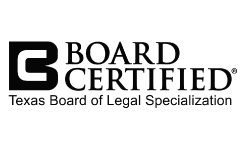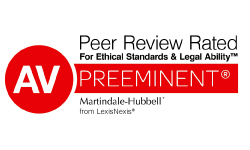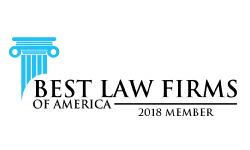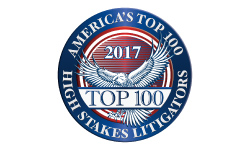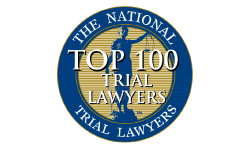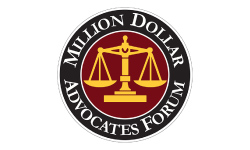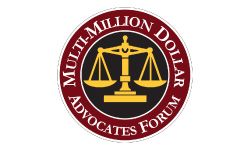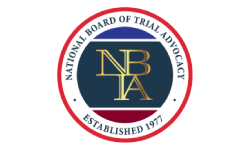Certified Experience Matters
Why Certified, AV-Rated experience matters
Don't just take our word for it
The National Board of Trial Advocacy has produced two excellent videos on this subject.
A note from Jeff:
"Born in Austin in 1970, I have devoted more than half of my life to the study and practice of law. I entered UT law school in 1992 and have been practicing law in Dallas since 1995. I am board certified by the Texas Board of Legal Specialization (Personal Injury Trial Law) and by the National Board of Legal Specialty Certification (Civil Trial Law).
Let me briefly explain why board certification should matter to you: Your matter is important whether it is a small business dispute or, obviously, the death or serious injury or a loved one. With only 10% of Texas attorneys able to claim board certification, you are generally better served to hire someone who has qualified to become board certified (by trying cases in a courtroom) and has then passed the rigorous examination. Less than two percent of Texas attorneys have two board certifications. Why leave your important matter to chance?
I have spent the last decade focused on hunting accident deaths and injuries, but I have tried cases in many areas with great success. My direct phone number is 214.580.9803. Call me, and I will guide you through the process of fighting for your rights, including your right to compensation."
Mark of Excellence
Board Certification is a mark of excellence and a distinguishing accomplishment. Within the Texas legal community, Board Certification means an attorney has substantial, relevant experience in a select field of law as well as demonstrated, and tested, special competence in that area of law.
A Distinguished Few
There are more than 70,000 attorneys licensed to practice in Texas. Only 7,000 are Board Certified. Board Certified lawyers earn the right to publicly represent themselves as a specialist in a select area of the law. In fact, they are the only attorneys allowed by the State Bar of Texas to do so. This designation sets them apart as being an attorney with the highest, public commitment to excellence in their area of law.
The process is voluntary and can only take place after an attorney has been in practice for five years, with a minimum of three years experience in the specialty area. Moreover, Board Certification is not a one-time event. It requires an ongoing involvement in the specialty area which is periodically substantiated with references from peers in that field. It also requires annual professional refreshment through TBLS approved, continuing legal education course work to stay abreast of current trends in law.
What are Martindale-Hubbell® Peer Review Ratings™?
The Martindale-Hubbell® Peer Review Ratings™ are an objective indicator of a lawyer's high ethical standards and professional ability, generated from evaluations of lawyers by other members of the bar and the judiciary in the United States and Canada. The first review to establish a lawyer's rating usually occurs three years after his/her first admission to the bar. LexisNexis facilitates secure online Martindale-Hubbell Peer Review Ratings surveys of lawyers across multiple jurisdictions and geographic locations, in similar areas of practice as the lawyer being rated. Reviewers are asked to assess their colleagues' general ethical standards and legal ability in a specific area of practice. The ratings appear in all formats of the Martindale-Hubbell® Law Directory, in the online listings on martindale.com®, Lawyers.comSM, on the LexisNexis services, on LexisNexis mobile apps.
The Ratings Explanation
Martindale-Hubbell® Peer Review Ratings™ reflect a combination of achieving a Very High General Ethical Standards rating and a Legal Ability numerical rating. A threshold number of responses is required to achieve a rating.
The General Ethical Standards rating denotes adherence to professional standards of conduct and ethics, reliability, diligence and other criteria relevant to the discharge of professional responsibilities. Those lawyers who meet the "Very High" criteria of General Ethical Standards can proceed to the next step in the ratings process – Legal Ability.
Legal Ability ratings are based on performance in five key areas, rated on a scale of 1 to 5 (with 1 being the lowest and 5 being the highest). These areas are:
- Legal Knowledge – Lawyer's familiarity with the laws governing his/her specific area of practice(s)
- Analytical Capabilities – Lawyer's creativity in analyzing legal issues and applying technical knowledge
- Judgment – Lawyer's demonstration of the salient factors that drive the outcome of a given case or issue.
- Communication Ability – Lawyer's capability to communicate persuasively and credibly
- Legal Experience – Lawyer's degree of experience in his/her specific area of practice(s)
The numeric ratings range may coincide with the appropriate Certification Mark:
- AV Preeminent® (4.5-5.0) – AV Preeminent® is a significant rating accomplishment – a testament to the fact that a lawyer's peers rank him or her at the highest level of professional excellence.
- BV Distinguished® (3.0-4.4) – BV Distinguished® is an excellent rating for a lawyer with some experience. A widely respected mark of achievement, it differentiates a lawyer from his or her competition.
- Rated (1.0-2.9) – The Peer Review Rated designation demonstrates that the lawyer has met the very high criteria of General Ethical Standing.
Areas of Practice
LexisNexis uses a specific practice area list in the review process to help ensure that all lawyers are rated upon equivalent practice areas, regardless of how individual lawyers choose to articulate their area of expertise. This allows users of ratings to compare and contrast lawyers with a specific area of practice. The Martindale-Hubbell® Peer Review Ratings™ area of practice list is based on user behavior, research on emerging areas of law, and other forms of legal research. LexisNexis updates the list regularly to reflect the changing needs of the legal industry.
Feedback and Comments
Martindale-Hubbell® Peer Review Ratings™ allow reviewers to provide feedback on the lawyer under review. Feedback is displayed anonymously in conjunction with the review results. Lawyers are allowed to place a one-time comment next to any of the feedback. Martindale-Hubbell subscribers are able to highlight two peer feedback comments and position them at the top of their ratings display. Peer Review feedback will be archived after two years.
Peer Review feedback/comments are published for all attorneys who are listed on our Martindale-Hubbell database. Martindale-Hubbell publishes lawyer/firm rating information it has gathered about lawyers/firms and provides a forum for other third parties to share what they'd like to share about any particular lawyer(s) on our websites martindale.com and Lawyers.comSM. The site is not law firm advertising and Martindale-Hubbell is not acting as agent for any lawyer or law firm in publishing this information. Each lawyer/law firm must decide for itself how it wishes to use any Martindale-Hubbell Peer Review Ratings information and, as stated in the terms of use, each lawyer/law firm is wholly responsible for ensuring that any use it makes of Martindale-Hubbell Peer Review Ratings or of data is compliant with the ethics rules affecting that lawyer/law firm.
